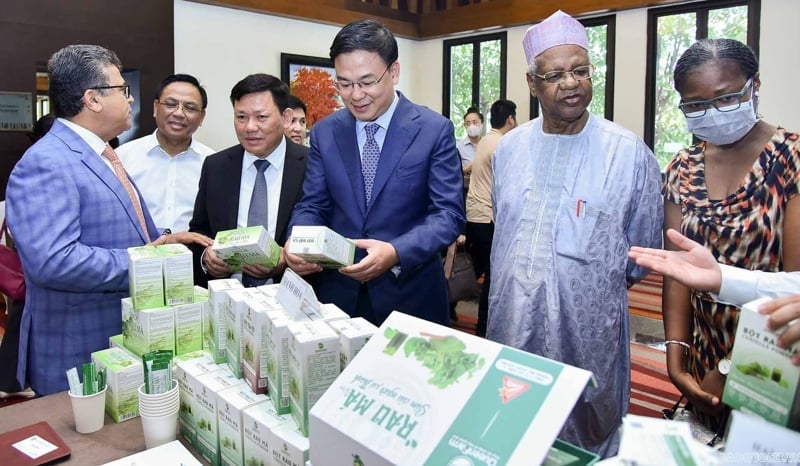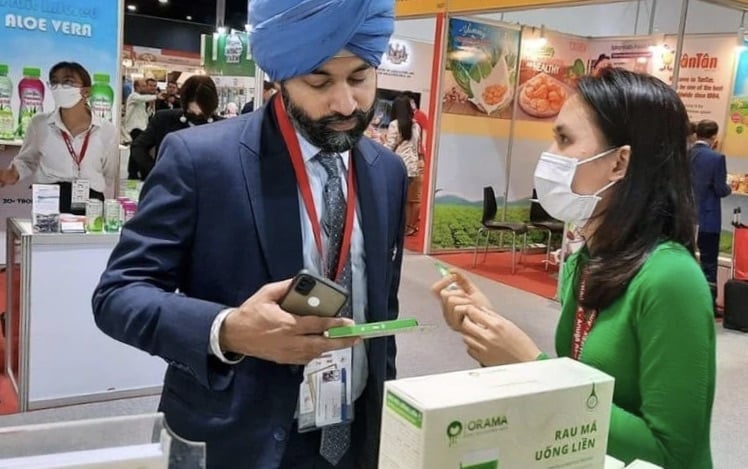November 26, 2025 | 02:07 GMT +7
November 26, 2025 | 02:07 GMT +7
Hotline: 0913.378.918
November 26, 2025 | 02:07 GMT +7
Hotline: 0913.378.918
The global Halal market, estimated at around USD 3,000 billion with nearly 2 billion consumers across more than 140 countries, presents significant opportunities for Vietnamese businesses. However, Vietnam’s current Halal export turnover is only about USD 700 million, a modest figure compared to its supply potential of up to USD 34 billion worth of goods for countries in the Organization of Islamic Cooperation (OIC).

Vietnam should not view Halal merely as an export standard, but rather as an opportunity to comprehensively upgrade its entire production value chain.
In this context, Vietnamese enterprises remain underexploited in key markets such as Malaysia and Indonesia. Malaysia, recognized as an international Halal hub with a well-established certification system, currently exports over USD 12 billion worth of Halal products annually and aims to reach USD 113 billion by 2030. Meanwhile, Indonesia, the world’s largest Muslim-majority economy with a population of over 280 million, is also actively developing a robust Halal ecosystem.
Vietnam holds significant potential to become a regional Halal manufacturing center. It boasts abundant agricultural resources such as rice, coffee, pepper, seafood, and tropical fruits - products that align well with international Halal standards and consumer preferences. Its strategic geographic location in Southeast Asia, near major consumer markets like Indonesia, Malaysia, and the Gulf Cooperation Council (GCC) region, along with a growing logistics infrastructure, further strengthens its competitive edge.
However, according to Mr. Ramlan bin Osman, Director of the Vietnam Halal Certification Authority, speaking at a recent seminar on promoting the Halal market in Vietnam, many domestic businesses still lack sufficient awareness and have yet to develop strong, credible brands capable of penetrating deeply into the global Halal market. The number of Vietnamese companies successfully exporting Halal products to Malaysia, the Middle East, and North Africa remains limited.
The Ambassador of the Islamic Republic of Pakistan to Vietnam, Mr. Kohdayar Marri, also underscored that simply labeling a product as Halal is not sufficient to win over Muslim consumers. For a product to truly gain the trust of Halal buyers, it must meet high standards of quality, ensure absolute safety, and be associated with a reliable brand - elements that Vietnamese businesses need to focus on developing more effectively.
From a management perspective, creating a transparent and credible Halal certification system is an essential step toward enhancing the competitiveness of Vietnamese products in international markets. This initiative calls for the active participation of the government in establishing institutional frameworks, developing supportive policies, and setting standards that align with global practices.
Some forward-thinking companies have already taken the initiative to study Halal standards, obtaining certifications from reputable international organizations such as JAKIM (Malaysia), MUI (Indonesia), and GAC (Gulf countries). This proactive approach opens doors for Vietnamese products to penetrate demanding Halal markets. However, despite these positive efforts, the number of companies receiving Halal certification remains relatively low compared to the scale of Vietnam’s agricultural and food industries.
One of the major challenges Vietnam faces is the absence of an official, nationally authorized Halal certification body. Currently, certification relies heavily on international organizations or foreign partners, which poses difficulties for businesses regarding costs, time, and legal consistency. Additionally, public awareness of the Halal market remains limited, leading to a shortage of qualified personnel who understand Halal standards across production, testing, and logistics.
Against this backdrop, the national plan titled “Enhancing international cooperation to develop Vietnam’s Halal industry by 2030” is regarded as a strategic step toward laying the groundwork for a professionally structured Halal industry in Vietnam. If effectively implemented, this initiative could create a coherent legal framework, promote workforce development, and support businesses in obtaining certification and expanding access to global markets.
According to experts, Vietnam should not treat Halal merely as a technical export requirement but as a catalyst to upgrade its entire production value chain, ranging from food safety, traceability, and processing procedures to brand development and service standardization. This shift in perspective would facilitate Vietnamese goods’ entry into Muslim-majority markets and enhance the overall quality, credibility, and global competitiveness of Vietnam’s agricultural, food, and cosmetics sectors.
In a recent study by Dr. Aemin Nasir, a lecturer at RMIT University Hanoi, Vietnam is missing out on participating in high value-added segments of the global Halal supply chain. Despite its strengths in agriculture and food processing, Vietnam mainly exports industrial goods to Muslim countries, such as electronic components, plastics, chemicals, and textile materials. In contrast, consumer Halal products like food, cosmetics, and pharmaceuticals are still largely absent.

One of the major obstacles is that Vietnam has yet to establish an official national authority for Halal certification.
Nasir proposes a strategic framework for a Halal ecosystem based on five pillars.
The first is institutional and policy support, which includes the proposal to establish a national Halal certification body (potentially named HALCERT) with legal authority and international recognition. This also involves developing regulatory standards aligned with those of SMIIC and the OIC and designing tax, credit, and customs incentives for Halal businesses.
The second pillar focuses on human resource development, including training Halal specialists in areas such as food inspection, logistics, and Shariah compliance. Collaborative training with institutions in Malaysia and Indonesia is encouraged to help standardize domestic professional capabilities.
The third pillar calls for investment in technical infrastructure, including laboratories, traceability systems, and Halal supply chain control technologies to ensure reliability throughout production and distribution.
The fourth pillar aims to enhance production capacity, focusing on products like rice, seafood, processed foods, and herbal-based cosmetics. Leading enterprises should be selected as pilot models to build a Vietnamese Halal brand in key target markets.
The final pillar involves developing Halal services, from dedicated logistics, dining services, and prayer spaces for Muslim tourists to integrating Halal products with the restaurant-hospitality sector and cultural-tourism industries.
Unlike the model in Malaysia, which relies on its domestic Muslim community, Nasir’s research emphasizes that Vietnam needs to design a Halal ecosystem that is flexible and tailored to its unique socio-economic conditions and demographic structure. The development process can be carried out in phases, with priority given to institutional building, raising awareness, and standardizing production and services.
Translated by Phuong Linh

(VAN) Deputy Minister Nguyen Quoc Tri emphasized the determination to prevent violations at CoP20, sharing enforcement results and commitments to strengthen cooperation with the international community in the coming period.

(VAN) In addition to strengthening the relationship between schools and enterprises, the Aus4Skills project expands opportunities for female students and people with disabilities to work in the transport and logistics sector.

(VAN) Nghe An is preparing policy, technical, and resource steps to participate in the forest carbon credit market.
/2025/11/25/1648-2-110733_532.jpg)
(VAN) From 2011 to 2023, Ca Mau province lost approximately 6,200 ha of coastal land and protection forests due to erosion, threatening many residential areas, infrastructure facilities, and production zones.

(VAN) Quang Ngai holds strong potential for carbon credits but needs a clear legal and policy framework to secure sustainable revenue from this resource.

(VAN) With its diverse ecosystem, Phu Quoc National Park plays a vital role in environmental protection and biodiversity conservation and serves as the core zone of the Kien Giang World Biosphere Reserve.

(VAN) Cooperation activities under the Aus4Skills program focus on: logistics professional development, competency-based training and assessment (CBTA), leadership innovation, and digitalization.